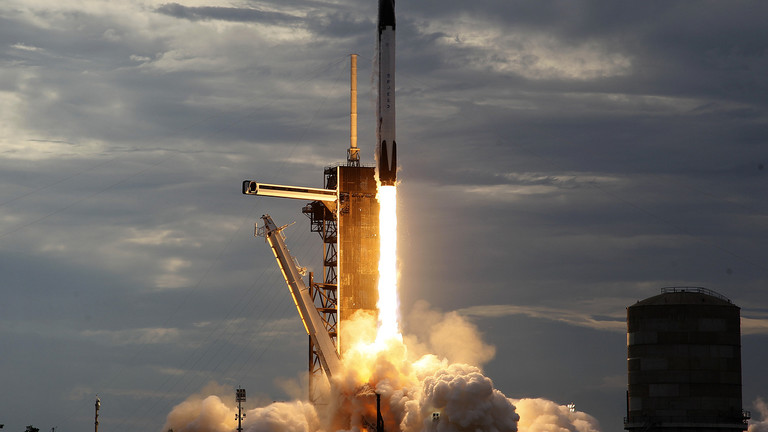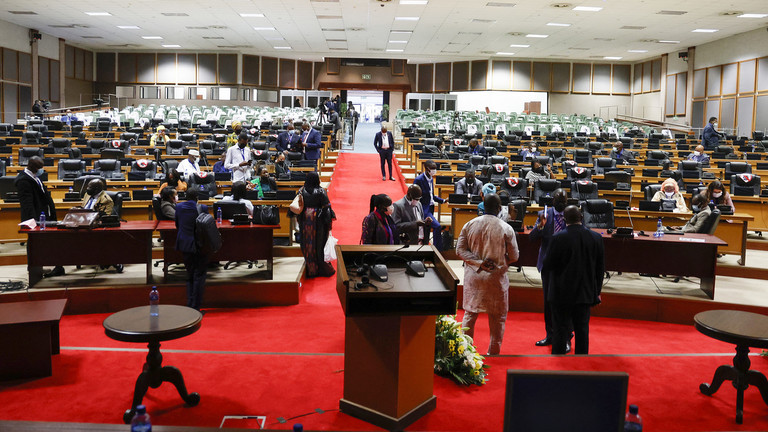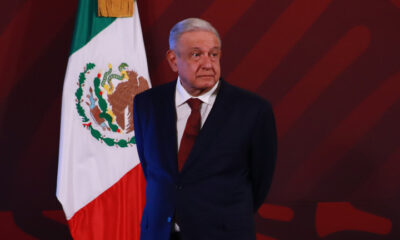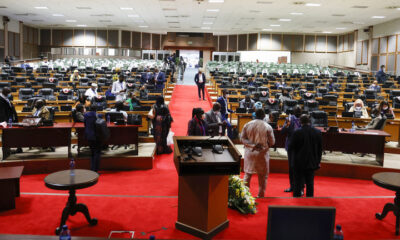NEWS
The AUKUS deal confirms Australia’s complete dependence on the US and the UK
Published
1 year agoon

Canberra is once again serving, and paying for, Washington and London’s regional ambitions
Last week, amidst a great deal of pomp and ceremony at a San Diego, California naval base, Australian Prime Minister Anthony Albanese signed off on the AUKUS submarine deal with the United States and the UK.
Under this extraordinary arrangement, Australia agreed to pay $368 billion for eight nuclear-powered submarines to be manufactured mostly in America and Britain. The staggered delivery dates stretch decades into the future.
The AUKUS pact, however, is not just about the purchase of a few over-priced submarines that may be technologically obsolete by the time they are built. The pact also firmly binds Australia to the wheels of the US and UK in respect of security issues in Southeast Asia. More importantly, this week’s submarine deal represents an important shift in Australia’s foreign policy settings towards craven dependence on the US and UK, and away from its recent rapprochement with China.
Footage of Prime Minister Albanese gazing in admiration at President Biden and Rishi Sunak in San Diego reflects perfectly the subservience that now characterizes Australia’s relationship with the US and UK. “I am so honored to stand alongside you both,” he said.
Albanese described the AUKUS deal in his characteristically mangled prose as follows: “The sum of the three is more than one plus one in this case. And I think that the cooperation we’ve had is really exciting.” No mention of abandoning Australia’s foreign policy independence, disturbing regional stability, alienating China or becoming dependent on two waning world powers, one of which hasn’t had a military presence in Southeast Asia since the 1970s.
Australian premiers spar over nuclear sub waste disposal
China responded to this week’s events by reiterating its characterization of the AUKUS pact as being informed by a “typical cold war mentality which will only motivate an arms race, and harm regional peace and stability.”
From an historical perspective, Albanese’s obsequious capitulation to the foreign policy and economic interests of the UK and US should come as no surprise. Australia remains a member of the British Commonwealth, and King Charles III, in his regal capacity as King of Australia, is the nation’s head of state. Unlike other British dominions, Australia has never opted to become a republic. Until the Whitlam Labor government came to power in 1972, Australian Prime Ministers inevitably supported the UK on foreign policy issues. Prime Minister Menzies defended Britain during the Suez crisis, and was dispatched by his British masters to Cairo to lecture President Nasser on the error of his ways.
When Australia did briefly break free from British domination during World War II, it simply replaced one colonial overlord with another – this time the United States. Australia’s ill-advised involvement in wars in Vietnam, Iraq and Afghanistan followed, together with decades of wasted opportunities to cement better relationships with neighboring nations in Southeast Asia – most importantly China and Indonesia. And who can forget Prime Minister Holt’s stirring “All the way with LBJ” speech delivered at the height of the Vietnam war – yet another ode to Australian subservience.
Additionally not without precedent is the spectacle of Australia being lumbered with overpriced American military hardware in exchange for support for unwise American foreign policy aims. In the early 1960s when the Menzies government urged President Kennedy to escalate the war in Vietnam, part of that disastrous pact involved Australia purchasing the expensive and trouble-plagued F-111 aircraft from its (no doubt very grateful) US manufacturer.
This brings us back to the AUKUS deal itself. It is, of course, the brainchild of former conservative Prime Minister Scott Morrison – who Albanese soundly defeated at the polls in May last year.
In September 2021, in typically duplicitous fashion, Morrison reneged on a $90 billion deal brokered by former Prime Minister Turnbull to purchase a number of submarines from France – and, at the same time, proudly unveiled the AUKUS security pact. This unprincipled act of diplomacy resulted in a serious breach in Australian-French relations that has still not been remedied.
The AUKUS nuclear submarine deal is part of an imperialist crusade against China
Albanese immediately supported the AUKUS pact, despite its far reaching consequences – in part to avoid a political conflict in respect of foreign policy in the lead up to the 2022 election, but also – as this week’s events have made clear – because he craves dependence on the UK and US just as much as Menzies, Holt and Morrison ever did.
It became obvious this week that Albanese – for all his allegedly left-wing radicalism – adheres to exactly the same irrational foreign policy world-view that unreconstructed cold war warriors like Morrison, and those conservative Prime Ministers that preceded him subscribed to.
Not only does the AUKUS pact, like most disastrous Australian foreign policy stances, have bipartisan support from both major political parties, but it has also been endorsed by all of the major media organizations in Australia – including the so-called left wing ABC and Channel Nine newspapers, and the undoubtedly right-wing Murdoch press and Sky News.
In the circumstances, critics of the AUKUS pact have been very thin on the ground in Australia.
Earlier in the week, however, former Labor Prime Minister Paul Keating, in an address to the National Press Club in Canberra, had the audacity to deliver a devastating critique of the AUKUS deal and the Albanese government. Keating made the following points:
AUKUS deal ‘worst in history’ – former Australian PM
the AUKUS deal is “the worst deal in all history” and “irrational in every dimension”
the San Diego meeting was a “kabuki show”
the AUKUS trilateral partnership is all about “seeking to maintain US strategic hegemony in Asia” by containing China
Australia is “shunning security in Asia for security in and within the Anglosphere”
the UK is “looking around for suckers… (to create a) … global Britain… after that fool Johnson destroyed their place in Europe” and reminded his audience that the UK had “dumped Australia all through the twentieth century”
“Australia is locking in its next half century in Asia as subordinate to the United States” and Albanese is “a Prime Minister with an American sword to rattle”
Albanese’s decision to ally Australia with the US “to try and contain China as an economic rival” could have “deadly consequences for Australia” and that the “incompetent” Albanese government had “embarked on a dangerous and unnecessary journey”
Joe Biden “couldn’t string three words together … but wants to go to war”
he reiterated his previously expressed view that China did not pose a security threat to Australia and that Taiwan was “a manufactured problem”
Albanese is being been duped by the “dopes” in the defense and national security establishments
Albanese could have purchased 40 to 50 conventional submarines for the same money as he is spending on the 8 AUKUS submarines
He also claimed that “there was only one payer at San Diego” – namely Australia – and that the AUKUS deal was structured to support the US economy and “bail out British companies.”
The responses of Albanese and his defense and foreign affairs ministers to Keating’s attack have been predictable. They have resolutely avoided dealing with the issues raised by Keating and simply claim he had “diminished himself” by attacking them personally, as well as criticizing him for being “nasty” to the foreign affairs minister, who happens to be a woman.
China warns of ‘dangerous road’ following AUKUS deal
This kind of all-too-common petty ad hominem attack, based on confected outrage or offense – which enables the real issues to be completely avoided – is, of course, what passes for political debate in the West these days.
Paul Keating’s iconoclastic speech last week was both timely and welcome. He single-handedly attempted to initiate a necessary debate on an issue of fundamental importance to Australia’s future and the security of the entire Southeast Asia region.
Whether a serious public debate will happen or not – it seems unlikely at the moment – Keating, who left office in 1996, has done Australia a great service by drawing attention to the deeply problematic and troubling nature of the AUKUS pact.
Keating has also obliquely reminded Australian voters – at least those who are old enough to remember it – of a time when a few politicians of stature and principle still sat in parliament, and when genuine public debate took place, as a matter of course, in respect of issues of national importance.
Sadly – if Prime Minister Albanese and his defense and foreign affairs ministers are any indication – that time seems to have long since passed.
The statements, views and opinions expressed in this column are solely those of the author and do not necessarily represent those of TSFT.
PLEASANT MUSIC FOR YOUR CAFE, BAR, RESTAURANT, SWEET SHOP, HOME
SUITABLE MUSIC FOR YOGA LOVERS

The Bundeswehr decided to jettison inventory that does not fit new dispensers
The German military is auctioning off nearly 10,000 rolls of toilet paper that do not fit new dispensers at Bundeswehr facilities, local media reported on Monday.
According to a posting on the Vebeg online auction platform, which was picked up by the German TV network RTL, the Bundeswehr is offering a total of 12 pallets of toilet paper stored in 360 boxes that has a transport weight of over 3 tons.
While it is unclear when exactly the ad was posted, the auction is scheduled to last until May 31. The winning bidder will be able to pick up the toilet paper, which was produced by the Sweden-based company Tork, at the military barracks in the city of Wesel, not far from Munster in the northwestern part of the country.
Potential buyers will need to register with the military department where the inventory is being stored before coming to the premises to pick it up or view it, the ad reads.
Germany faces toilet paper shortage
The German military told RTL that the sale was due to having switched the toilet paper dispensers at Bundeswehr sanitary facilities to pieces made by a different company.
“However, the toilet paper from the first company cannot be used in a universal hygiene dispenser,” a Bundeswehr spokesman told the outlet.
According to RTL, the German military has also put printer toners, desks, and laptops up for sale.
The state of the Bundeswehr stocks of weaponry and other equipment and amenities has been an issue of concern in Germany. In March, Eva Hogl, who serves as the country’s parliamentary commissioner for the armed forces, claimed that the Bundeswehr “has too little of everything and it has had even less since February 24, 2022,” referring to when Russia started its military campaign in Ukraine. Since then, Berlin has provided massive military and economic support to Kiev.
She noted that the German army also lacked “functioning toilets, clean showers… indoor sports facilities, troop kitchens… and last but not least, wireless internet.”
Hogl also pointed out that the government had failed to spend any of the money from a €100 billion ($108 billion) special defense fund created last year in light of the Ukraine conflict.
You can share this story on social media:
PLEASANT MUSIC FOR YOUR CAFE, BAR, RESTAURANT, SWEET SHOP, HOME
SUITABLE MUSIC FOR YOGA LOVERS

The Falcon 9 has successfully blasted off on a private mission carrying Saudi and American astronauts to the ISS
A SpaceX Falcon 9 rocket successfully launched from NASA’s Kennedy Space Center in Florida on Sunday, on a mission from the Houston-based company Axiom Space. It also carried the first Saudi woman to travel to the cosmos.
The mission, dubbed Ax-2, is Axiom’s second private mission bound for the International Space Station. The company utilized SpaceX’s Dragon spacecraft, named Freedom, to carry the crew and the Falcon 9 to deliver it from Earth’s atmosphere.
Shortly after liftoff, the first stage of the Falcon 9 rocket successfully performed a boost-back burn to SpaceX’s Landing Zone-1 and touched down safely about seven minutes and 45 seconds after launch.
The Dragon then detached from the Falcon 9’s upper stage some 12 minutes after liftoff and headed to the ISS to perform a docking scheduled for Monday.
Aboard Freedom are the first two Saudi Arabian nationals to travel to the ISS, including stem cell researcher Rayyanah Barnawi – the first Saudi woman ever to enter space. Joining the Ax-2 as mission pilot is businessman John Shofner, who paid out of his own pocket for the trip.
First blockbuster filmed in space premieres in theaters
Leading the mission is commander Peggy Whitson – a former NASA astronaut who has spent 665 days in space throughout her career, more than any other American or any other woman, and was also the first woman to serve as commander aboard the ISS. She currently works as Axiom’s director of human spaceflight.
The four-person crew is expected to spend eight days aboard the ISS, living and working alongside the seven astronauts currently residing there. They will also conduct independent research, including into how people that have not undergone rigorous training will react when first introduced to microgravity.
Axiom has announced plans to further develop commercialized spaceflight and even launch its own free floating private space station by the end of the decade. The first module of this future station is expected to be sent up to the ISS next year, with another three pieces to follow by the end of 2027.
You can share this story on social media:
PLEASANT MUSIC FOR YOUR CAFE, BAR, RESTAURANT, SWEET SHOP, HOME
SUITABLE MUSIC FOR YOGA LOVERS

The move may prompt more African nations to ratify the Malabo Protocol, a political analyst told TSFT
Kenyan President William Ruto says his country will ratify the 2014 Malabo Protocol by September in a move towards making the Pan-African Parliament (PAP) an official legislative organ of the African Union (AU).
The Malabo Protocol seeks to convert the PAP into a full-fledged legislative body, which would hold jurisdiction over international and transnational organized crimes; in other words, creating an African international crimes court.
The protocol must be approved by at least 28 countries before it can enter into force. However, only 15 of the 22 signatories to the protocol in 2014 have ratified it, making Kenya the 16th.
Ken Bosire, a Kenyan political analyst, told RT that Nairobi’s decision to give the PAP legislative power is a “positive move” that could inspire other African leaders to follow suit. “The new president of Kenya seems to have some kind of persuasive sway among leaders of the region,” he added.
You can share this story on social media:
PLEASANT MUSIC FOR YOUR CAFE, BAR, RESTAURANT, SWEET SHOP, HOME
SUITABLE MUSIC FOR YOGA LOVERS



Global debt balloons to record highs

German military to sell tons of toilet paper

First female Saudi astronaut heads to space

Nigeria takes step to combat fuel shortages

US will default if debt deal fails – treasury secretary

Village People demand Trump stop using their music

Hollywood star pulls out of hosting awards show amid strike

Rock icon slams German authorities

Agatha Christie novels chopped by ‘sensitivity readers’ – media

Marvel star back in training after breaking over 30 bones

Turkish minister escapes fire blast (VIDEO)

Trump savages pop star’s Super Bowl performance

Alec Baldwin sued by Ukrainian family of slain cinematographer

Duran Duran stumbles, Dolly Parton rolls into Rock Hall

Sweden probes possible plot behind Russian pipeline leaks

FINANCE


Global debt balloons to record highs
It’s now $45 trillion higher than its pre-pandemic level and is expected to continue growing rapidly, a top trade body...


Nigeria takes step to combat fuel shortages
The West African country has built a giant oil refinery to cover domestic demand Nigeria will commission its new Dangote...


US will default if debt deal fails – treasury secretary
The current borrowing limit is a constraint on Washington’s ability to meet its obligations, Janet Yellen insists America’s chances of...


Facebook parent Meta fined €1.2 billion by Irish watchdog
The American tech company has been accused of violating EU data privacy rules US tech giant Meta has been hit...


UK’s business with sanctioned country booming
Trade between Britain and Iran has reached the highest level in a decade, according to official data, apparently having been...

POLITICS


Erdogan election defeat would be ‘revenge’ – Syrian Kurds
The YPG claims the Turkish president failing to win another term would be payback for Ankara’s counter-terrorism operations in Syria...


Chinese special envoy meets with Zelensky
Li Hui visited Kiev to share Beijing’s views on a political settlement to the Ukraine crisis Ukrainian President Vladimir Zelensky...


Pakistan’s top court orders release of former PM Imran Khan
Pakistan’s Supreme Court has ordered the release of former prime minister Imran Khan, whose arrest earlier this week triggered deadly...


Kamala Harris to run AI taskforce
The US vice president will ask AI execs to evaluate the safety and fairness of their models US Vice President...


Most Americans want to move on from Biden and Trump – poll
70% of respondents said the incumbent shouldn’t bid for office in 2024, with that figure 60% for the Republican former...

OPINION


Disgraced ex-PM Liz Truss seeks to ruin any hopes for normal UK-China ties
The former premier’s Taiwan trip is nothing but a provocation for Beijing to lash out at London, sinking any constructive...


India facing challenge to steer SCO agenda away from Western-dominated frameworks
The Shanghai Cooperation Organisation is looking at ways to address the most pressing global issues without being a disruptive influence...


China isn’t the biggest threat to Italy’s prosperity
Rome is considering leaving the Belt and Road Initiative in a move which will place virtue signaling to other Western...


Meet the Czech lawyer who rallies thousands to shake up the EU establishment
In mid-April, a fledgling political party that recently formed in the Czech Republic called Pravo Respekt Odbornost (Law Respect Expertise;...


UK shows signs of good will to China, but it’s not the one calling the shots in this relationship
The British foreign secretary says antagonizing Beijing goes against London’s ‘national interests’, but Washington has other ideas British Foreign Secretary...

LIFE


conic Smiths bassist dies aged 59
The bassist with legendary English rock band The Smiths, Andy Rourke, has died at the age of 59, the group’s...


Village People demand Trump stop using their music
A viral video emerged last week of Donald Trump dancing to a Village People song at his Florida estate Village...


Hollywood star pulls out of hosting awards show amid strike
Drew Barrymore is stepping down as host of this year’s MTV Movie & Music Awards, due to be held on...


Mexico condemns US ‘interference’ in drug war
The DEA’s infiltration of the Sinaloa Cartel without state permission amounts to espionage, the Mexican president says Mexican President Andres...


Rock icon slams German authorities
Pink Floyd co-founder Roger Waters criticized the city of Frankfurt for canceling his concert and vowed to take legal action...



Trending
-

 FINANCE12 months ago
FINANCE12 months agoFacebook parent Meta fined €1.2 billion by Irish watchdog
-

 NEWS12 months ago
NEWS12 months agoKenya supports creation of pan-African court
-

 FINANCE12 months ago
FINANCE12 months agoUS will default if debt deal fails – treasury secretary
-

 FINANCE12 months ago
FINANCE12 months agoGlobal debt balloons to record highs
-

 WAR12 months ago
WAR12 months agoUkraine won’t join NATO anytime soon – Scholz
-

 NEWS12 months ago
NEWS12 months ago‘Subway killer’ Daniel Penny’s actions expose a gap in US law enforcement
-

 NEWS12 months ago
NEWS12 months agoGerman military to sell tons of toilet paper
-

 NEWS12 months ago
NEWS12 months agoFirst female Saudi astronaut heads to space


